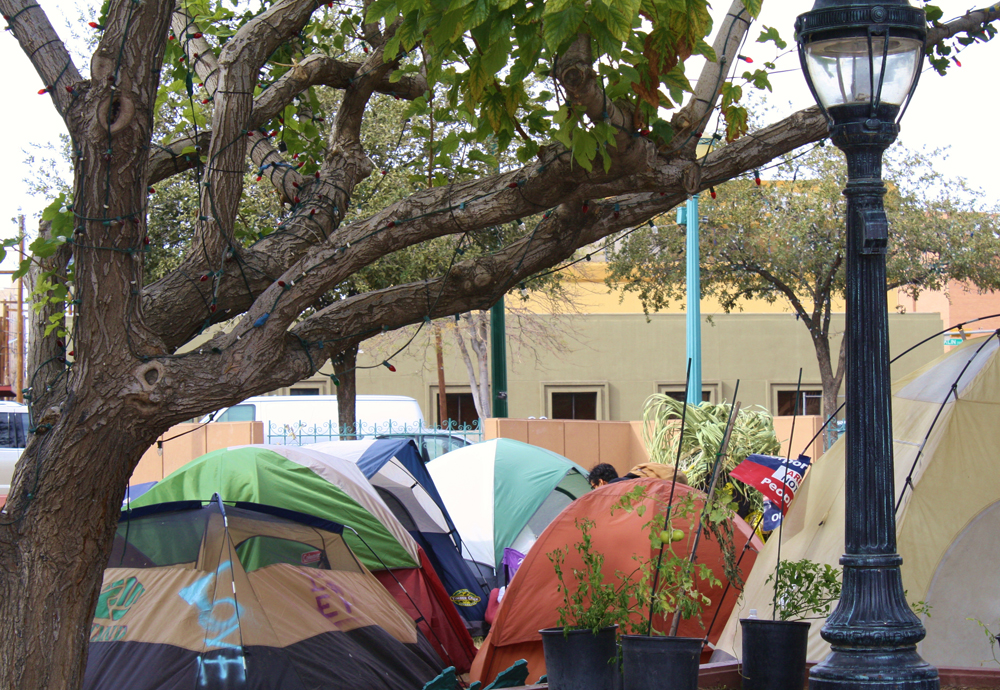EL PASO – As a child of the sixties and an observer of decades of apathy, I am happy to see young people protesting and demonstrating. “Occupy Wall Street” and all the other Occupiers are finally in revolt against the status quo.
But protesters aren’t going to sleep in the parks forever, especially with winter coming. Already, local governments are trying to move demonstrators out. If they don’t succeed, Mother Nature eventually will. The people who have been involved with the Occupy movements say that the demonstrations have built “community.” I think that means that like-minded folks have connected with each other, exchanged food, ideas, Facebook, e-mail, and other information. So, “occupying” a particular place 24/7 is no longer necessary to stay in touch. It might be important to have weekly, or even daily, events to let people know the issues of the 99% have not been forgotten. So what should happen next?

(Cheryl Howard/Borderzine.com)
November 5th was the date that people were supposed to move their money (if they had some) from banks to non-profit Credit Unions. I did that more than forty years ago, after figuring out that Bank of America was not really the best friend they pretended to be. If you didn’t do it November 5th, do it now. Credit Unions provide virtually all the services that banks do, and do so in a kinder, gentler way.
We need to think carefully about what businesses we support and what products we purchase. This is going to take some research, but isn’t that what the internet is for? How many of us have unwittingly bought a Godfather’s pizza? Are we supporting companies that have unfair or abusive labor practices? Harm the environment? Support political agendas we disagree with? With a little work, we can identify problem corporations and withdraw our business.

(Cheryl Howard/Borderzine.com)
Advertisers tell us what we should want, how, if we wish to be cool, successful, attract potential mates, have fun, etc., we should shop. Apparently we listen to them. An exercise I used in my gender class was for students to estimate how much they and a person of the opposite gender spent on personal products in a variety of categories (hair, skin, teeth, clothing, jewelry, tattoos, etc.). Inevitably, women spent more on average than men and earned less from their work. In class discussions following this exercise, I would point out several things. First, beyond a small amount of money required to be clean and presentable, everything else is optional and expensive, and our money could be better spent on assets that maintain or increase in value over time (like an education, property, antiques), rather than consumables or products that lose value as soon as we buy them (new cars, for example). Second, companies ask us to pay to advertise for them; our bodies are often product placement ads whether we know it or not.
Third, we sometimes have our priorities mixed up. Does it make sense to work extra hours for a new car payment or to make a minimum payment on our out of control credit card balance, sacrificing both learning and grades in the meantime? Are we jeopardizing a great job offer or the ideal graduate school? Moreover, that credit card company understands interest rates and penalty fees, and they get rich counting on us to remain ignorant of these matters. We need to educate ourselves.
We don’t realize the power of our individual and collective voices. One year, I asked students to pick something that made them angry or unhappy, a policy, a person, or a product. Then write a letter expressing their discontent. Their letters were mailed and we waited for answers. The students were shocked that anyone answered their letters, but most of the class got a response. They learned that they did have some power after all. Now imagine that you tell all your friends they shouldn’t buy this or shop there…and they tell their friends, and so on. And this is the power of social networking as entrenched dictators have reluctantly learned from dissatisfied young people.
We are not likely to ever join the 1%, not because we don’t work hard or have good ideas, but because wealth in this country is largely inherited; if our parents aren’t rich, we aren’t apt to be either. So one thing we can do is help support each other. News Taco (a website for portable, sometimes offbeat, Latino news suggests we “avoid corporate shopping and instead support local, fair trade, or independent business this holiday season.” There are several local holiday markets and fairs coming up. The city has a new Saturday Art Market in the Union Plaza district downtown. The second annual Small Business Saturday is November 26. That’s one place to start.
Can I get a mic check on this?


